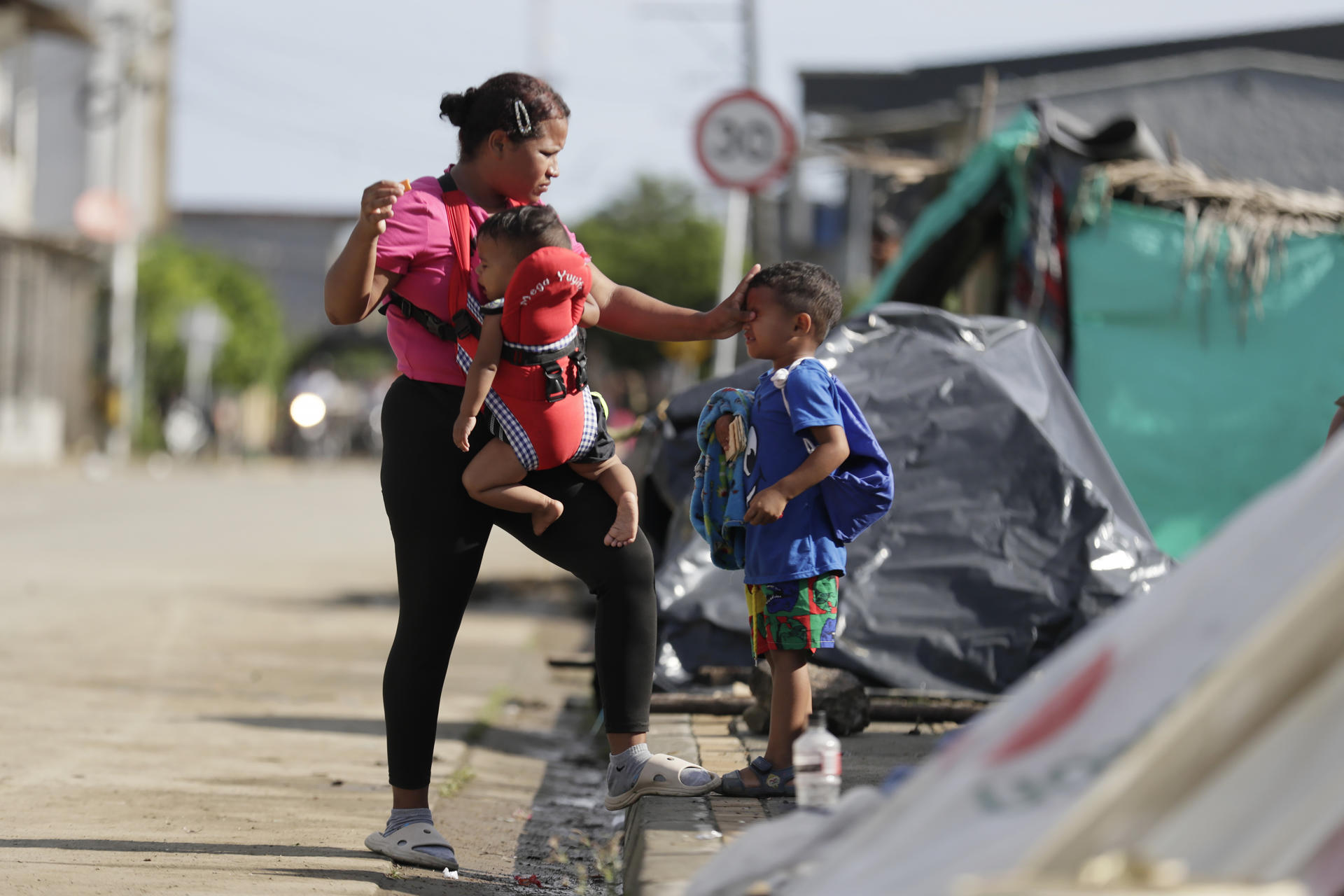Venezuelans cross the Darién after the July 28 elections

Venezuelans continue to be the majority among the migrants who cross the Darién jungle, the natural border between Panama and Colombia, heading to North America, and some of them speak of “the worst trap in the world” in the July 28 elections in Venezuela.
“Oh, they cheated, the worst cheat in the world,” Venezuelan Johanna Calanche, 23, told Efe this Thursday, along with her 4-year-old child, installed in a wooden cabin in a Panamanian reception center for migrants, which can be reached by canoe along the Tuquesa River after crossing the jungle for several days.
The young woman explains that during election day in Venezuela she supported the opposition in logistics by preparing food, and that since “they did not want to give the results,” she left tired and went to bed.
“And what I heard was around 1 in the morning that my husband touched my feet and told me: ‘Black, we’re going to have to leave again.’ And I say, ‘why?’ ‘Because we lost,’” he recalls.
They had migrated to Chile, Ecuador, Peru and Colombia, and with the setback of the elections after returning to Venezuela, they would now head north, towards the United States.
Political and immigration crisis, united
The president of Panama, José Raúl Mulino, focused this week in his speech before the UN General Assembly on the migration crisis in Darién, and its relationship with the political and economic situation in other countries such as Venezuela, for which he warned that You can solve one problem without solving the other.
But this crisis comes from afar, and for years it has been reflected in the number of Venezuelans who cross the Darién, who are the majority.
In 2023, the historical record of migrants who crossed the Darién occurred, with more than 520,000. Approximately 63% of them were Venezuelans, according to official data provided by Panamanian authorities, a percentage that remains unchanged after the July electoral crisis.
In August, the last month with complete data, Panama recorded 16,603 arrivals, of which 70% were Venezuelans, while in August 2023, of the 81,946 migrants who crossed Darién, 76% were from the South American country.
These data reflect a drop of almost 80% in the number of migrants who crossed the Darién between August 2023, the month with the most arrivals in a record year, and August of this year.
The government of Panama attributes this decrease to the measures adopted to reduce the migratory flow since it came to power and estimates that in 2024 around 320,000 migrants will cross this jungle – with more than 260,000 already so far this year -, which represents a reduction of 38% compared to the record of 2023.
Among the measures implemented were the closure of some trails with barbed wire and an agreement with the United States, signed on July 1, in which Washington committed to financing repatriation flights with initial support of 6 million dollars.
The first flight, bound for Medellín, departed on August 20 with around thirty deported Colombian migrants. Since then, at least 12 flights have repatriated 473 migrants from Colombia, Ecuador and India, while Venezuelans remain without being deported due to the lack of agreements between Venezuela and Panama.
Fear of deportations
Migrants do not hide their fear of deportation, a fear that did not exist in the past, when in general everyone continued their path to the United States without hindrance. Some families have been separated. Franyelis Córdoba is Venezuelan, her partner Brayan Pineda is Colombian.
Córdoba details that they even went to a notary before starting their trip to prove that they lived together in Colombia, but that when they arrived at the migrant center, they took Pineda’s identity document, took it away and after a biometric examination they told him that He would return the next morning.
But “in the afternoon they came to look for him, to collect all his belongings, and they took them away in a truck, sitting as if they were criminals,” he says, regretting that his partner, a soccer player with no criminal record, he claims, made the trip. through the Darien because she couldn’t take a plane as a Venezuelan.
Colombian couple Laura Valentina Pérez, 22, and Yuru Yiseth Rubio, 32, also say they were held “longer than normal” during immigration security checks, fearing a possible deportation.
They let the families pass, and they didn’t. “We even felt discriminated against because we were both going through it as a couple,” explains Pérez.
They are installed at the entrance of a small tent, sweaty under the morning sun, after having left Colombia, a country where there is “a lot of discrimination” towards homosexuals.
“The issue that they are persecuting you, the issue that they want to abuse you because (you are with) a sex equal to yours, because you think differently, all of that made us flee,” says Rubio.
Independent journalism needs the support of its readers to continue and ensure that the uncomfortable news they don’t want you to read remains within your reach. Today, with your support, we will continue working hard for censorship-free journalism!
